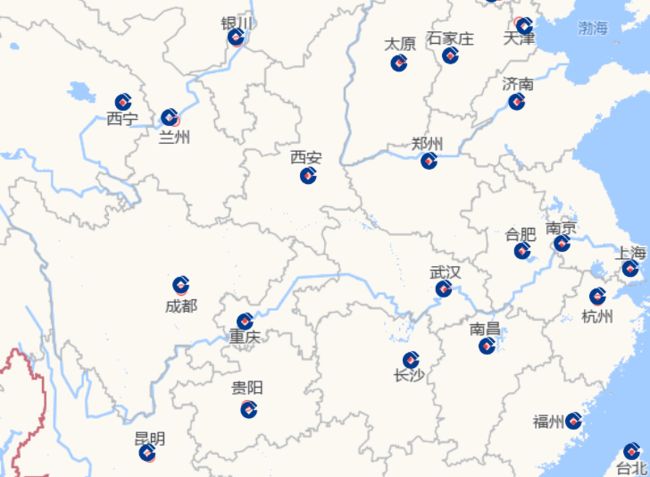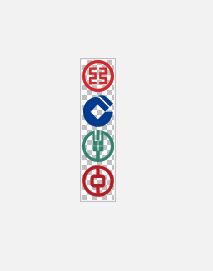mapboxGL中sprite生成与引用
概述
用过mapboxGL的都知道里面有个叫做sprite的配置,它的主要用途就是地图上渲染图标的,但是大多数情况下我们需要自定义图标的,我们该怎么办呢,莫着急,牛老师有招,本文告诉你如何通过几行简单的java代码实现,用引用到我们的地图中。
效果
生成的json文件如下:
{
"zgyh": {
"visible": "true",
"pixelRatio": 1,
"x": 0,
"width": 32,
"y": 105,
"height": 32
},
"jsyh": {
"visible": "true",
"pixelRatio": 1,
"x": 0,
"width": 32,
"y": 35,
"height": 32
},
"nyyh": {
"visible": "true",
"pixelRatio": 1,
"x": 0,
"width": 32,
"y": 70,
"height": 32
},
"gsyh": {
"visible": "true",
"pixelRatio": 1,
"x": 0,
"width": 32,
"y": 0,
"height": 32
}
}
实现
1.图片准备
为了简单测试效果,本文的图标都是从iconfont下载的,同时为了方便,图标大小统一为32px。
2.java生成雪碧图和json
import java.awt.*;
import java.awt.image.BufferedImage;
import java.io.*;
import com.amazonaws.util.json.JSONObject;
import javax.imageio.ImageIO;
public class MergeImg {
public static File[] getFiles(String path) {
File file = new File(path);
if(file.isDirectory()) {
File[] files = file.listFiles();
return files;
} else {
return null;
}
}
public static void append2File(String file, String content) {
try {
File f = new File(file);
FileWriter fw = new FileWriter(f, true);
PrintWriter pw = new PrintWriter(fw);
pw.println(content);
pw.flush();
fw.flush();
pw.close();
fw.close();
}
catch (IOException e) {
e.printStackTrace();
}
}
public static void main(String[] args) throws Exception {
String path = "D:\\lzugis\\code\\lzugis\\out";
File[] files = getFiles(path + "\\img");
int width = 32;
int height = 35 * files.length;
BufferedImage bufferedImage = new BufferedImage(width, height, BufferedImage.TYPE_INT_RGB);
Graphics2D graphics2D = (Graphics2D) bufferedImage.getGraphics();
bufferedImage = graphics2D.getDeviceConfiguration().createCompatibleImage(width, height, Transparency.TRANSLUCENT);
graphics2D.dispose();
graphics2D = bufferedImage.createGraphics();
JSONObject jsonObject = new JSONObject();
for (int i = 0; i < files.length; i++) {
File file = files[i];
if(!file.isDirectory()) {
String name = file.getName();
name = name.substring(0, name.lastIndexOf("."));
BufferedImage bi = ImageIO.read(file);
int x = 0;
int y = 35 * i;
int h = bi.getHeight();
int w = bi.getWidth();
graphics2D.drawImage(bi, x, y, w, h, null);
JSONObject js = new JSONObject();
js.put("x", x);
js.put("y", y);
js.put("width", w);
js.put("height", h);
js.put("pixelRatio", 1);
js.put("visible", "true");
jsonObject.put(name, js);
}
}
graphics2D.dispose();
FileOutputStream out = new FileOutputStream(path +"\\merge.png");
ImageIO.write(bufferedImage, "PNG", out);
append2File(path +"\\merge.json", jsonObject.toString());
}
}
3.地图调用
地图调用的方式如下:
initMap: function() {
var rootPath = 'http://localhost:63342/learn-demo/mapbox/lib/';
var mapStyle = {
"version": 8,
"name": "Dark",
"sources": {
"XYZTile": {
"type": "raster",
"tiles": ['http://webrd01.is.autonavi.com/appmaptile?x={x}&y={y}&z={z}&lang=zh_cn&size=1&scale=1&style=8'],
"tileSize": 256,
}
},
"sprite": rootPath + "merge",
"layers": [{
"id": "background",
"type": "background",
"paint": {
"background-color": "#111"
}
},
{
"id": "XYZTile",
"type": "raster",
"source": "XYZTile",
"minzoom": 0,
"maxzoom": 22
}
]
};
map = new mapboxgl.Map({
container: 'map',
maxZoom: 18,
minZoom: 0,
zoom: 3,
center: [109.1699, 45.9719],
style: mapStyle,
attributionControl: false
});
map.on('load', function() {
that.addMarkers();
});
},
addMarkers() {
$.get('../data/capital.json', res => {
var geojson = {
'type': 'FeatureCollection',
'features': []
};
for (var i = 0; i < res.length; i++) {
const r = res[i];
geojson.features.push({
type: 'Feature',
geometry: {
type: 'Point',
coordinates: [r.lon, r.lat]
},
properties: r
});
}
that.addGeojson(geojson);
})
},
addGeojson(geojson) {
map.addSource('points', {
type: 'geojson',
data: geojson
});
map.addLayer({
'id': 'points',
'type': 'symbol',
'source': 'points',
'layout': {
'icon-image': 'jsyh',
'icon-size': [
'interpolate',
['linear'],
['zoom'],
4, 0.6,
8, 0.9,
12, 1.2
]
}
});
}

